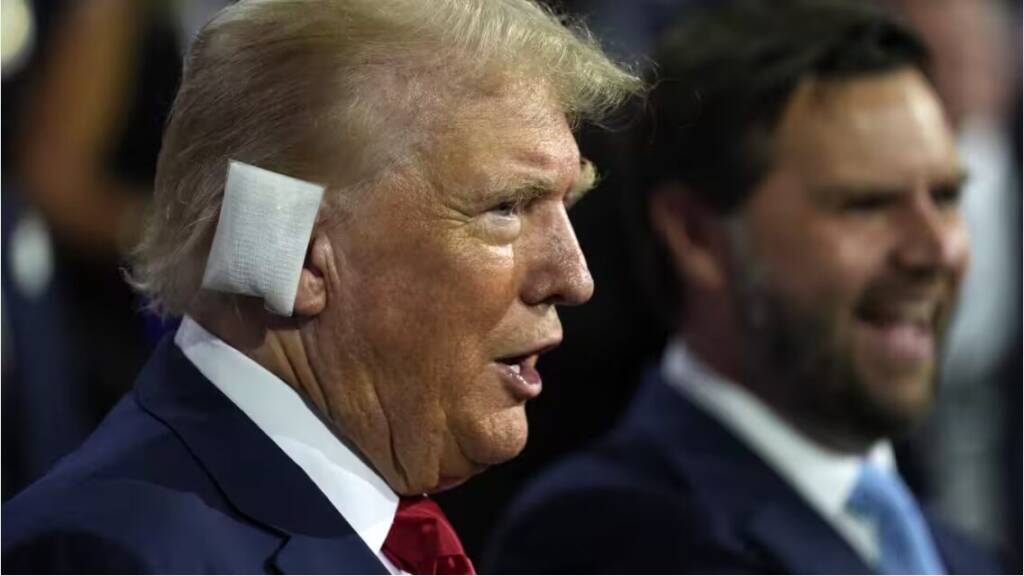The Republican Party is thrilled. After President Joe Biden’s lackluster performance in the recent televised debate and his apparent cognitive lapses at the NATO Summit, Donald Trump’s re-election seems more likely. Following the assassination attempt last Saturday, Trump now has a new opportunity to present himself as a brave leader willing to risk his life for America, a narrative the Republicans hope will attract a broader voter base.
One faction within the party, known as the “prioritisers,” is particularly excited. With Trump’s announcement of J.D. Vance as his vice presidential candidate, this group feels energized. This faction, which includes the influential Heritage Foundation and former Pentagon official Elbridge Colby, argues that the U.S. military’s global overreach weakens its ability to deter China from invading Taiwan. They blame the backlog of $19 billion in arms deliveries to Taiwan on the U.S.’s prioritization of aid to Ukraine. They clash with the party’s “primacists,” such as Nikki Haley, Mitch McConnell, and Lindsey Graham, who believe the U.S. can fight multiple wars simultaneously by simply increasing military spending. Meanwhile, the “restrainers,” including Senators Rand Paul and Mike Lee, advocate for reducing U.S. global military commitments altogether.
Vance is seen as the ideal representative for the prioritiser argument. He was the first senator to bluntly call European countries American “client states” and argue for a shift in the hierarchy between Europe and America, advocating for stronger European capabilities. “America does not need clients, it needs allies,” Vance wrote after the Munich Security Conference. He has consistently argued that wealthy European nations like Germany should defend Ukraine without U.S. help, as American resources are limited and aiding Ukraine hinders the successful deterrence of China in Taiwan. With Vance as Trump’s running mate, the prioritisers feel they have secured a potential pathway to the White House.
However, it’s unclear if Trump himself aligns with this faction. His views on China are unpredictable. During his presidency and even now, Trump has exhibited restrainer tendencies. He has refused to confirm if he would defend Taiwan against China, accusing Taiwan of stealing U.S. semiconductor technology, and recently opposed legislation requiring TikTok to divest from Chinese ownership. The Congressional Oversight Committee report showed China spent millions at Trump Organization entities during his presidency.
Trump’s current China policy focuses on imposing high tariffs—up to 60 percent according to the Trump 47 Agenda—on Chinese goods. This focus on the trade deficit suggests he might seek a trade deal, potentially making concessions on semiconductor technology or Taiwan, directly conflicting with the prioritisers’ Taiwan policy and the broader Republican consensus on deterring China.
The rift between Trump and his administration isn’t new. During his first term, his primacist cabinet and Congress often undermined his deal-making, such as with the delivery of F-35 fighter jets to Turkey. It remains to be seen whether the prioritisers in Project 2025, who claim loyalty to Trump’s policies, can influence his decisions or curb his deal-making tendencies. Trump’s defeat over TikTok in Congress indicates he might not be able to stray far from the Republican consensus on China.
Regardless of how the rift between Trump and his administration plays out, it’s not promising for Europe. A prioritiser-led cabinet or a more erratic Trump would leave Europe facing a significant dilemma in the U.S.-China rivalry. A future prioritiser administration would likely expect Europe to take decisive action on technology and export controls, investment screening, supply-chain resilience, and cybersecurity concerning China. They would also expect the European Union, especially Germany, to address Huawei’s presence in its critical infrastructure.
Conversely, a Trump presidency might escalate tariffs on both China and Europe with a universal baseline tariff on all U.S. imports. This would force European governments to make tough choices, balancing U.S. pressure for economic security policies against potential Chinese retaliation, risking a trade war with the U.S. Additionally, Vance and his advisors would likely push for wealthy European nations to backfill U.S. contributions to Ukraine and overall European security.
If there’s one positive aspect of a prioritiser administration, it’s the recognition that the U.S. needs a strong Europe to effectively contain China. This could mean reduced U.S. resources for Ukraine and compromised European security, regardless of disagreements on Taiwan and China policy. A Trump-Vance alliance will undoubtedly impact European security and the economy. While the EU single market offers some leverage, security remains Europe’s biggest vulnerability. The EU may struggle to respond effectively, especially if member states find it hard to meet defense spending targets due to fiscal constraints. Therefore, revitalizing the EU’s defense funding role, such as through proposals like Thierry Breton’s €100 billion bond issuance for defense expenditure, should be reconsidered. Similarly, Ursula von der Leyen should lead on China and trade issues. Her track record might gain her some credit with Republican prioritisers, helping negotiate exemptions from a universal baseline tariff and prevent a U.S.-EU trade war. If there’s a silver lining, it’s that a prioritiser administration recognizes the necessity of a robust Europe to counter China effectively.
